BAHRAIN
History

History
History
Antiquity
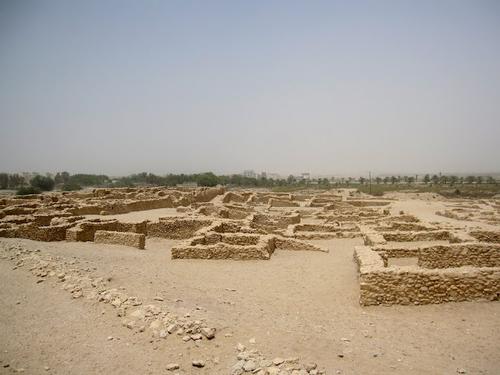 Dilmun culture BahrainPhoto: Rapid Travel Chai CC 3.0 Unported no changes made
Dilmun culture BahrainPhoto: Rapid Travel Chai CC 3.0 Unported no changes made
Bahrain's history dates back to the dawn of humanity. Bahrain Island is approx. 6000 years BC. detached from the Arabian mainland and has almost certainly been inhabited since prehistoric times. In the third millennium BC. Bahrain enters world history. It was then known as Dilmun, one of the great trading empires of the ancient world.
The empire benefited from its strategic location between Mesopotamia and the Indus Valley. The Middle East had a much milder climate ± 4500 years ago than it is now, although it was already getting drier then. Dilmun was a sacred island in Sumerian mythology. The Sumerians were one of the first civilizations to flourish in today's southern Iraq. The Sumerians descended from the Ubaids and Bahrain continued this contact after the creation of Dilmun, 3000 BC. At its peak, Dilmun's influence extended north to present-day Kuwait and inland to the Al-Hasa Oasis in eastern Saudi Arabia.
Between 1600 and 1000 BC. Decline set in and this coincided with the fall of Indus Valley Civilization in Pakistan. Dilmun suffered greatly as a trading port on the route from Mesopotamia to the Indus. Dilmun's decline continued for centuries afterward and into the 8th century BCE. Dilmun was mentioned as an indebted part of Assyria. A few centuries later, Dilmun was completely taken over by the Babylonians and ceased to exist. Of the next 200 years, almost nothing is known about this region, which only reappears after the arrival of the Nearchus, an admiral of Alexander the Great's army in the 4th century BC. Bahrain was used until the advent of Islam in the 7th century AD. commonly known by its Greek name Tylos. The period 300 BC. to 300 AD. was a reasonably prosperous one. The dominant regional power at the time was the Seleucid Empire, one of the successor states of Alexander the Great's empire. The Seleucid Empire stretched from present-day Israel and Lebanon to Mesopotamia and Persia and probably Bahrain. The Seleucids, who ruled only briefly, were succeeded by the Parthians, a Persian dynasty. The Parthians ruled Bahrain until the third century and were succeeded by the Sassanids who annexed Bahrain in the fourth century. Many residents of Bahrain had already converted to Christianity in the third and fourth centuries. The Sasanian Empire was also a center of Zoroasterianism and Manichaeism. However, Zoroastrianism became the official religion of the Sasanian Empire. Apostates were persecuted, but Bahrain was often spared these persecutions. In the early 5th century, the Nestorian Christian sect established itself in Bahrain and along the Arabian side of the Gulf. The two dioceses in Bahrain survived until about 835. Evidence has also been found that Bahrain also controlled part of the adjacent coast during this period. Bahrain's main island was then also known as "Awal", a name still used by the Bahrainis until the early 20th century.
Islam and Portuguese rule
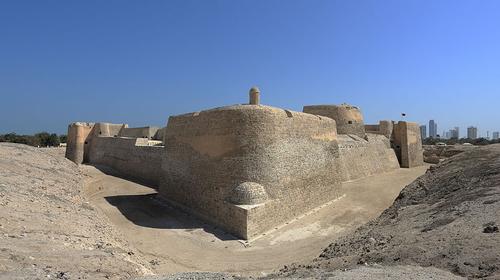 Bahrain FortPhoto: Martin Falbisoner CC 4.0 International no changes made
Bahrain FortPhoto: Martin Falbisoner CC 4.0 International no changes made
Bahrain is one of the first areas outside the Arab mainland to convert to Islam. Around 640 Bahrain adopted Islam, but Christians and Muslims would coexist peacefully for two more centuries. From the 9th to the 11th century, Bahrain became part of the Umayyad and the Abassid Empire. Bahrain regained reasonable prosperity and was once again an important place on the trade route between Mesopotamia and the Indian subcontinent. During the Middle Ages, conveniently located Bahrain was ruled by various rulers, as was the rest of the Gulf region, which was constantly at war. The Omanis conquered Bahrain and the Muharraq Islands in 1487 and built Arad Fort on Muharraq.
By 1485, Portuguese Duarte Barbosa was the first European to visit Bahrain. He called the islands "Barem", referring to the quantity and quality of the pearls found. The Portuguese fleet conquered the islands around 1520. As a pearl fishing port, Bahrain had, and was, a certain economic value to the Portuguese, important because of the large stocks of fresh drinking water and its strategic location. Bahrain was therefore on the front line when the Ottoman Turks and the Portuguese fought for control of the Gulf region in the first half of the 16th century. The second half of the 16th century was quieter because the Portuguese had firm control over Bahrain.
Al-Khalifa family, Britain and oil
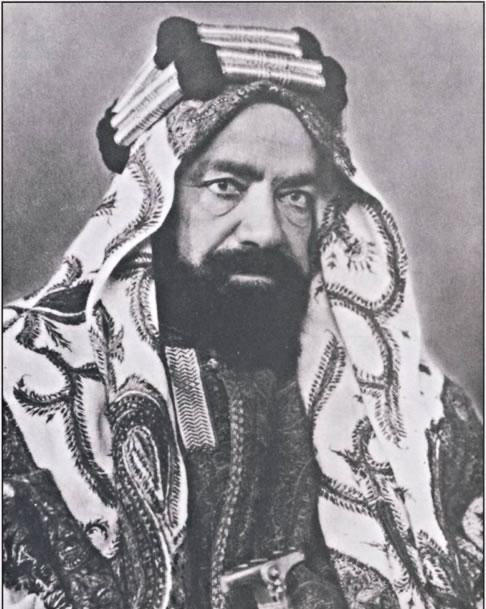
In 1602, the brother of one of Bahrain's richest traders, Rukn-el-Din, was executed. Rukn el-Din led the ensuing revolt and the Portuguese were driven from the island. Rukn el-Din quickly sought support from the Persians (Shah Abbas I the Great), and as a result Bahrain remained part of Persia throughout the 17th century. In the mid-18th century, the Al-Khalifa family arrived in Bahrain from Kuwait. Around 1782, Sheikh Ahmed al-Fatih expelled the Persian garrison and occupied the main islands of the Bahrain archipelago with the help of the Al-Sabah family in Kuwait. Bahrain and the Muharraq Islands were of great importance at the time because their location made them fairly immune to the raids of the Wahhabis, ancestors of today's Saudi Arabian royal family. These raids were frequent until about 1818. Ahmed ruled until his death in 1796, after which his two sons Abdullah and Sulman took over. In 1799, however, the two brothers were chased away by the Omanis. Only in 1820 did he manage to recapture the islands. Shortly afterwards, Bahrain concluded a treaty with Great Britain in which Bahrain declared that it would not engage in piracy against British ships. From 1834, the British began to formalize their presence in the Gulf. In fact, India became an increasingly important part of the British kingdom, and security in the Gulf was therefore paramount. In 1835 the rulers of the various Gulf States were more or less forced by the Royal Navy to sign a peace treaty. The British also urged the abolition of slavery. Yet it did not remain quiet for long in the Gulf region. Around 1840, three decades followed with many problems. After Khalifa's death, his son, Mohammed bin Khalifa, established himself on the throne in Muharraq as a co-ruler and rival of Abdullah. In 1843, he captured Al-Zubra in Qatar and deposed Abdullah, who would die in exile five years later. In 1861, Mohammed made a treaty of friendship, the "Treaty of Perpetual Peace and Friendship" with the British. These treaties (idem in 1881 and 1891) gave Britain control of the foreign affairs of Bahrain and other Gulf states in exchange for protection by the British army. Mohammed bin Khalifa was soon challenged by the son of the expelled Abdullah, Mohammed bin Abdullah. He attacked Bahrain from the Arab mainland. During this turbulent period, war broke out between Bahrain and Qatar that ended in 1868 when Mohammed bin Khalifa fled to Quatar and his brother Ali proclaimed himself ruler of Bahrain. In Qatar, Mohammed bin-Khalifa built a new fleet, invaded Bahrain and killed Ali in 1869. However, Mohammed bin-Khalifa made a grave mistake, giving Mohammed bin-Abdulah a high post in the conquering army. After the capture of Bahrain, he immediately deposed Mohammed bin-Khalifa and put him in prison. The British saw this and decided to intervene. The Royal Navy made their way to Bahrain, both Muhammads were deported to Bombay in India and Ali's son Sheikh Isa bin Ali was appointed as the Emir. Sheikh Isa's bloodline has ruled Bahrain ever since. Since the interest of the British was only to keep the Turks out of the region, they stayed out of Bahrain's domestic politics for the rest of the 19th century. Both Turkey and Persia continued to claim Bahrain until 1970 but did not dare to challenge the British. The very conservative Sheikh Isa bin Ali ruled until his death in 1932. In 1923 he was forced by the British to hand over the day-to-day business to his son Hamad, who would rule until 1942 after his father's death. Immediately after taking office in 1923, he started modernizing Bahrain. Ten years later, after the discovery of oil, the pace of modernization was accelerated. Schools, hospitals and new mosques were built, practically the entire country was electrified and an airport was constructed. Important to the development of Bahrain was the arrival in 1923 of a new advisor to the Emir, Charles Belgrave. He was instrumental in setting up an education system and bguided the development of infrastructure on the island. World War II passed quite unnoticed. A day after the British, the Bahrainis declared war on Germany and Italy in 1939. Bahrain was of course very important in connection with the supply of oil for the armies of the Allies. Sheikh Hamad was succeeded in 1942 by his nineteen-year-old son Sulman. The standard of living was already very high in Bahrain at that time, also compared to the oil giants such as Saudi Arabia and Kuwait. The production of oil was not much compared to these two countries, but Bahrain, due to its location, served as an important store for the oil from the entire Gulf region.
Bahrain towards independence
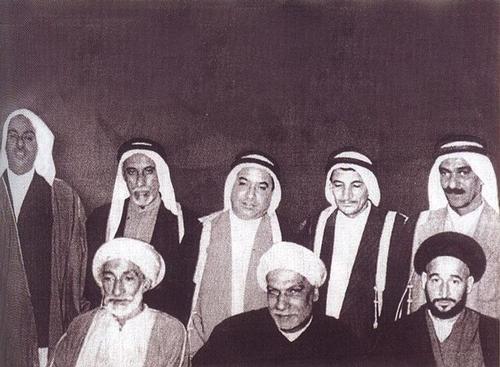 Bahrain Committee of National Unity 1954Photo: Public domain
Bahrain Committee of National Unity 1954Photo: Public domain
In the fifties of the twentieth century, there was very turmoil in the Arab world. Egyptian President Nasser, for example, strongly opposed the colonial presence in the Arab world and thereby created a process of awareness in the Arab world. Also in Bahrain more and more people came with an aversion to the British. In particular, students who had studied in Cairo, Beirut or London came with an antipathy towards the British back in their country. In 1952 reform-minded Sunni and Shia members of the communities formed an eight-person Higher Executive Committee. They demanded Western-style unions, a parliament and the resignation of Belgrave. Although Belgrave was allowed to stay, the Emir granted several other wishes. Things got somewhat out of hand in 1956 when stones were thrown at British Foreign Secretary Selwyn Lloyd on his visit to Bahrain. In retaliation, several members of the Committee of National Union (successor to the Higher Executive Committee) were deported. In November of that year, several people were killed in riots following the Suez crisis. British troops landed to protect the oil fields, but at the same time, deliveries of oil from Saudi Arabia to Bahrain's oil refinery were halted. Not long after, Belgrave "retired". The emir appointed another Briton, but by that time things had settled down and they continued to earn a lot of money. Sheikh Sulman died in 1961 and was succeeded by his son Isa bin Sulman al-Khalifa, who ruled until his death in March 1999. He was succeeded again by his son Hamad bin Isa al-Khalifa. After Britain announced its intention to withdraw from the Gulf, Bahrain joined in late 1971 in an effort to federate with Qatar and the seven "Trucial States", now the United Arab Emirates. Being the largest in population of the nine emirates, Bahrain claimed the greatest control in the proposed federation. The others refused to respond, after which Bahrain decided to go on alone and declared independence on August 14, 1971, with the consent of Great Britain. Great Britain concluded a treaty of friendship with the new state without any defensive obligations. Qatar also withdrew from the future federation. At the end of 1972 a kind of working group was set up to prepare a new constitution. The Emir approved the constitution in May 1973 and elections were held later that year for a "National Assembly" which first met in December of that year. Twenty months later, the body was dissolved by the Emir because radical members made it impossible for the executive to function properly. From that time on, the country is governed by those decrees of the emir that are carried out by the cabinet. In 1975, trade unions and strikes were banned by law. During the 1970s and 1980s, Bahrain achieved tremendous economic growth due to the high oil price and excellent infrastructure, the best in the entire Gulf region. A threat to the regime appeared to be the 1979 Islamic revolution in Iran and the subsequent First Gulf War between Iran and Iraq (1980-1988). Not only did Bahraini Shiites of Iranian descent argue for an Islamic state, Iran also appeared to be renewing its historic claims to Bahrain.
Internal riots and democratic developments
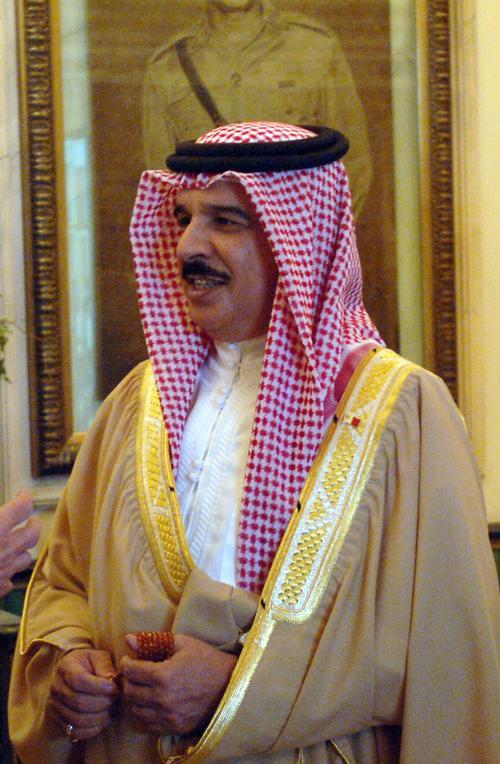
Recent is the status as storagepoil has declined, but the economy is increasingly focused on the development of industry and the service sector (including tourism) and as a result, people have become less dependent on oil. Bahrain, for example, has become one of the region's major financial centers as Beirut's successor in Lebanon. In the late 1980s, the Gulf region was experiencing a lot less economic growth, but Bahrain remained calm and prosperous. For example, the shipping industry did good business in the mid-1980s, repairing tankers hit in the Iran-Iraq war. In 1985 a conspiracy against the state was dismantled. Bahrain made significant arms purchases from the United States and provided facilities to the US naval units that patrolled the Gulf in 1987 and 1988. Remarkable was the rapprochement with Iran;in December 1990, the Iranian Foreign Minister visited Bahrain. The King Fahd Highway between Bahrain and Saudi Arabia in 1986 gave a boost to the business world and tourism. In the early 1990s, Bahrain had close ties with Iran, while relations with Iraq reached an all-time low following a missile attack on Bahrain in the Second Gulf War. After the Gulf War, Bahrain became the base of the United Nations weapons inspectors. In 1999 the Bahraini government asked for these bases to be closed. In 1991 conflict arose with Qatar over the Hawar Islands and the Fasht al-Dibal and Jaradah sandbanks, where oil had been found;Qatar claimed sovereignty over the islands. In 1994 the Emir refused to accept a petition with 25,000 signatures calling for more democracy. Dissatisfaction with this sparked some riots in Shia villages west of Manama in November 1994. The main demands of the protesters were restoration of the sidelined parliament and a better distribution of prosperity (30% of the Shia population was unemployed). 16 people were killed and many hundreds of people were arrested. In 1995 and 1996 there was also unrest and several bomb attacks were committed and foiled. The government accused Iran of complicity. In December 1996 Bahrain boycotted the Gulf Cooperation Council Summit (GCC: together with Saudi Arabia, Oman, Kuwait, United Arab Emirates and Qatar) in Doha (Qatar) ) due to a border dispute with this country. Relations with other Gulf countries also deteriorated as a result of this border conflict. Bahrain and Qatar regained diplomatic ties in 1997. In 1997 young unemployed people started fires in protest against discrimination against the Shia majority (the ruling al-Khalifa family is Sunni) and the lack of democratic reforms. The large number of jobs occupied by Asians were also a thorn in their side. Bahrain again accused Iran of training and financially supporting the rioters and cracked down on the dissidents. Bahrain recalled its ambassador from Tehran. Sheikh al-Khalifa did decide to include members of the opposition in his government. After that it remained quiet and violence is rare. In 1998 the visit of the Iranian former president Rafsanjani led to a cautious rapprochement between the two countries. The departure of the infamous head of the Bahraini Security Forces, Briton Ian Henderson, was much appreciated by the (Shia) opposition, as was the signing by the Bahraini government of the UN Convention against Torture. In 2001, the International Court of Justice in The Hague assigned the Hawar Islands to Bahrain. The ongoing conflict with Qatar ended with domestic politics dominated by the Al-Khalifa family and some important Sunni trading families. The opposition is divided and includes small, more radical opposition groups. The main opposition party is the Bahrain Freedom Movement (BFM). After his death in 1999, Sheikh Isa was succeeded by his son Sheikh Hamad bin Isa al-Khalifa. The latter has been actively involved in political decision-making. In February 2001 he won widespread opposition support for a political reform plan, thus initiating the process of political liberalization. In line with this reform plan, the Emir approved in February 2002 a constitutional amendment that changed his country's form of government to a constitutional monarchy and conferred the title of King on the Head of State. It also called municipal elections for May 2002 and general elections for October 24, 2002. The new constitution granted suffrage to both men and women. These changes laid the foundations for a democratic system in Bahrain.
Parliamentary elections will again be held in October 2006 in which the Shias, who refused to participate in the 2002 elections, will participate. This commitment was made, after some amendments to the Societies Law were recently accepted. However, the opposition continues to pursue wider parliamentary powers and less influence from the Consultative Council (Shoura Council).
The elections finally took place in November 2006 and the Shias have 40% of the vote won. Their leader Jawad bin Salem al-Oraied is appointed Deputy Prime Minister. In September 2007, thousands of illegal immigrants were given amnesty. In May 2008, Houda Nonoo was appointed Bahrain's Ambassador to the United States. She is the first Jewish representative of an Arab country. In April 2009, the king pardoned 170 prisoners suspected of endangering national security. In 2011 there are protests in Bahrain in the aftermath of the Arab Spring, the protests are quashed but are repeated during the 2012 Grand Prix. to contain. At the end of 2013, the (Shia) opposition stopped talks with the government. Reconciliation talks in 2014 also fail, the November 2014 parliamentary elections are dismissed by the opposition as a farce. In August 2016, a UN-appointed commission accused the government of systematically harassing the Shia opposition. In 2017, there are further actions by the government against the Shia minority. A huge new oil field is discovered in 2018, and Ali Salman, the opposition leader, is sentenced to life in November 2018 for alleged espionage for Qatar. On September 15, 2020, Bahrain and the United Arab Emirates signed a peace agreement with Israel in Washington DC.
Sources
Robison, G. / Bahrain, Kuwait & Qatar
Lonely Planet
Whetter, L. / Live & work in Saudi & the Gulf
Vacation Work
CIA - World Factbook
BBC - Country Profiles
Last updated January 2026Copyright: Team The World of Info